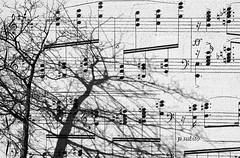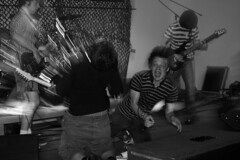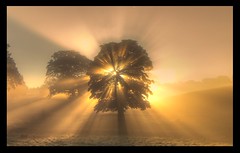
I remember a transposer software that automatically generates the chords in a different key for a song. Transposing is useful as it helps us sing a song at a more comfortable pitch if the song is either too high or too low for the range of our voice.
Why is it that even if one raises or lowers the key, one can still recognize the song? Regardless of which octave it is on, the distinct character of the song is retained. This property brings one thing to my mind -
each one of us is a song.
We all have our unique character, personality and identity. Its what we call the
self in philosophical terms or the
soul in spiritual jargon. Is it possible to preserve or extend the "self" even when the material substrate from whence the mental life arises is destroyed? It cannot be denied that the brain supports much of our consciousness. Marked changes to the brain from injuries, drugs, strokes, senelity, surgery or illnesses such as Alzheimer's literally changes the mind. How can one's sentient life and consciousness can be regenerated, extended or even resurrected if it depends on a fragile piece of crumpled meat? Let us explore a premise : There is some sort of a "metadata" repository of an individual's moment by moment slice of consciousness through time. Our very existence leaves behind trails of information regarding our "self". A history. Consider this scenario : If all of my very self, my soul, and everything that makes me who I am - past, present and future - were laid out flat and static as one long page of musical piece frozen in time (think of Julian Barbour's Time). Now if a Superbeing that transcends all dimensions were to change bits of the past chords of my life and rearrange notes here and there, then my soul's "DNA" loses the unique essence of who I am - it would be the utter destruction to my
soul. Every single bit of past experiences has molded the "me" in it's entirety. The choices I made in the past shaped my identity. Had I chosen different decisions, I might have been a different "me" - another song with a different tune.
Throughout life, an individual's soul is being written out on this current octave- the physical world. Each day is like a musical bar, and every minute we are leaving 'notes' as the universe records the 'musical piece' of our soul. Whether we like it or not, our very existence leaves behind trails of information regarding our "self" as time goes by. Could it be really true that each one of us will eventually give an account of one's life? For if there's a record, then it can definitely be played back by the superintellect who owns such a "database" (Heb. 4:13, Ecc 12:14).
Time goes by, i.e, it "moves forward" because there might be another octave that everything is destined to move into - a higher key, a higher dimension (such concepts of higher dimensions already have a mathematical description used in the field of String Theory that they call the Calabi-Yau Space). In that higher plane, it may be possible to completely regain our personality, memories, consciousness, and mental life. Somewhat like 'porting' or transposing the 'self' into a higher platform. Could resurrection really be possible? Only if
Someone 'ports' our soul, a Cosmic Musician who must transpose everything for us to ever get a shot at a future life.
Is there something beyond for us? Or is there nothing at all? Something or Nothing, Eternal or Ephemeral. Its our choice what to believe now, but whichever is our choice, that is our faith.
But if one is still challenged by the question of life beyond death or the even existence of a personal self to begin with, then perhaps the Song metaphor will give an insight. Each individual is a song.
It is amazing how a glimpse of some understanding about the human soul can be gleaned from the field of music. As Ludwig von Beethoven said, "Music is a higher revelation than philosophy." Indeed, music has been providing insights throughout the ages over mysteries of nature. We hear phrases such as "harmonies of nature", "music of the spheres", and "Cosmic Symphony". Its no wonder why String Theory, which probes the very fabric of the universe is hinging upon the metaphors provided by music. Our universe simply screams of such archetype patterns for us not to notice.
 We all have these "alter-egos" and we like to create names for our alternate identities. In the digital realm, they are represented as Avatars. We live out adventures behind those 'aliases' and seek out worlds for them to inhabit. But in the end, we all come back to reality, back to our rightful place, and come home with our true identity and rightful name.
We all have these "alter-egos" and we like to create names for our alternate identities. In the digital realm, they are represented as Avatars. We live out adventures behind those 'aliases' and seek out worlds for them to inhabit. But in the end, we all come back to reality, back to our rightful place, and come home with our true identity and rightful name. 




